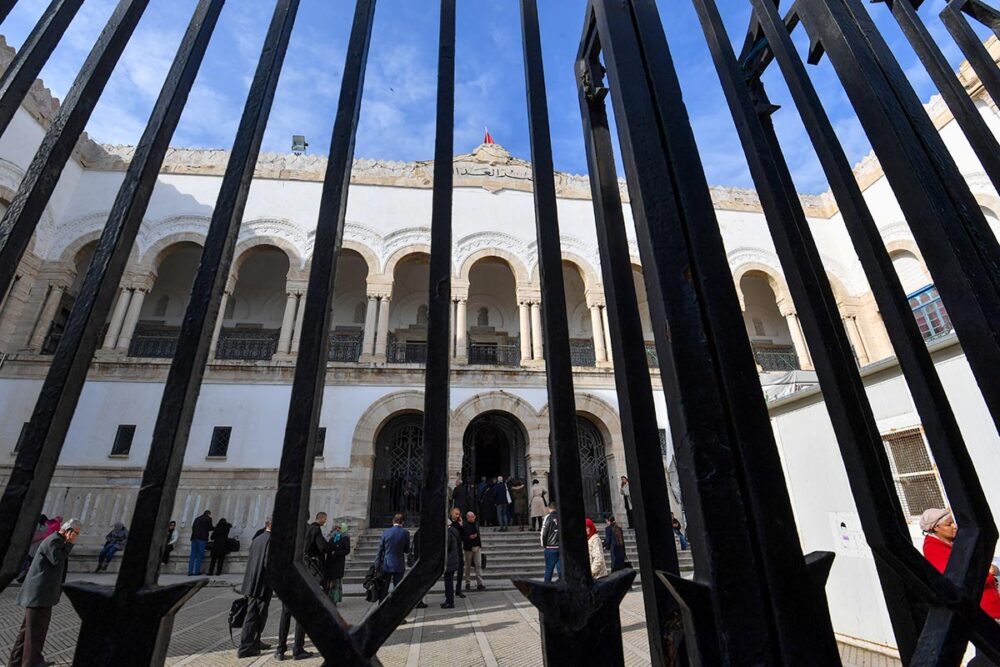“Manach msallmin! Manach msamhin! We will not give in! We do not forgive!” This slogan regularly punctuates the fiery speeches of Béchir Khalfi, a former Islamist activist and political opponent tortured under the presidency of Ben Ali (1987-2011). “There are 30,000 of us victims who have obtained reparation decisions from the Truth Commission. I appeal to the Justice Ministry and say stop impunity!” cries Khalfi. “We believed in transitional justice. We believed in this process that was supposed to restore the rights and dignity of victims. Yet, over the years, none of this has happened. Where are arrest warrants for the accused? Why are the specialized chambers so paralyzed?”
On Monday 19 May, under the shady fig trees of Avenue Bab Bnat there is a revolutionary air. A sit-in has been taking place since 10 a.m: the 20 or so victims present are determined to express their frustration in front of the Ministry of Justice, a few metres from the Tunis Court of First Instance where a dismissive transitional justice hearing has just ended. The president of the specialized criminal chamber announced the postponement of 11 scheduled cases from May 19 to September 22 this year, a decision announced before a full courtroom and in the presence of several members of the NGO Avocats sans Frontières, the World Organization Against Torture and former president of the Truth Commission Sihem Bensedrine.
The anger is palpable among the demonstrators, who are mainly former political prisoners, now aged over 60. Seven years have passed since the specialized chambers were inaugurated on May 29, 2018, but no verdict has yet been handed down. None of the 205 cases referred by the Truth and Dignity Commission (IVD, as the Tunisian Truth Commission is known) to the country’s 13 chambers has yet been brought to trial. None of the cases has even reached the pleadings stage. “You, the Ministry of Justice, are prosecuting and convicting Internet users for mere comments, while torturers who have committed homicide continue to circulate freely with the blessing of politicians. What a mess! If you think we’re ever going to give up, you are sadly mistaken,” continues Khalfi. “Manach msallmin! Manach msamhin!” the other victims repeat in chorus.
Obstacles and constant delays
Transitional justice has faced major obstacles in Tunisia since it was launched in 2014 and the Truth Commission started work, three years after the Jasmine Revolution that toppled Ben Ali. The obstacles it faces today stem from the Tunisian government’s persistent refusal to implement the recommendations of the Commission’s final report, which was published in the Official Journal in June 2020.
Up to now, the victims’ only hope was to obtain justice through these specialized chambers, which are supposed to judge the serious human rights violations committed between July 1955 and December 2013, including murders, torture, rape, and enforced disappearances. But the judicial authorities’ refusal to execute the arrest warrants issued for senior security service members suspected of having committed state crimes has further obstructed the already chaotic operation of the specialized chambers, with hearings constantly postponed.
For the past seven years, it has been the same scenario in Tunis, Gabes, Nabeul, Gafsa and elsewhere: if the defendants are present, their lawyers are absent, and if the lawyers hired by the defendants are there, they brandish their clients’ medical certificates. The transitional justice magistrates are overburdened with work, since they also continue to rule on ordinary law cases, a situation denounced by several national and international NGOs observing the Tunisian judicial process.
Worse still, following the judicial rotation of September 2023, the reassignment of seven of the 13 presidents of the specialized chambers led to a further slowdown in the processing of cases due to a lack of quorum. After almost two years of deadlock, the Tunis chamber, which handles 62% of the transitional justice cases, resumed its hearings on March 17, 2025 on a weekly basis, every Monday.
“Just window-dressing”
The demonstrators outside the Ministry of Justice are all familiar faces: former left-wing political prisoners, trade unionists, victims of the 1984 bread revolt or militants of Ennahdha, the Tunisian Islamist movement. Their numbers are dwindling from year to year as a result of illness, death or despair. For more than ten years now, their desire for recognition, dignity, truth and accountability has been linked to the transitional justice process that emerged from the 2011 revolution.
Elmy El Khadri, president of the Al-Karama association for rights and freedoms and himself a former victim of the dictatorship, has over time become an archivist of this justice process. He doesn’t miss a single hearing of the specialized chamber in Tunis and, since January 2025, has been involved in writing a monthly newsletter documenting its progress. “We believe that the reactivation of this chamber is nothing more than window-dressing,” the 75-year-old tells Justice Info. “It’s a way of making the UN bodies believe that transitional justice is continuing in Tunisia. We are not fooled: the procedure for setting up the chambers is illegal. Firstly, the judges were appointed not by the Supreme Council of the Judiciary (CSM), which no longer exists in practice since 2022, but via a memo from the Ministry of Justice. Secondly, they have not received specific training in transitional justice, as required by law. This is an essential condition for guaranteeing fair and effective trials. Plus, Article 8 of the organic law on transitional justice stipulates that the chambers must be composed of judges selected from among those who did not take part in political trials before the revolution. How can we be sure that this requirement is respected today?”
He thinks that far from moving towards a positive outcome, the judicial process is at the end of its tether, a victim of obvious obstructions by the authorities, who are no longer disguising their ambition to put an end to the process. El Khadri points clearly to the weaknesses of the president of the Tunis Chamber, who has so far not questioned a single defendant or witness: “I was dismayed to hear her invoke, on March 24, 2025, the principle of res judicata and the statute of limitations on a crime or sentence that dates back decades. This is proof that she didn’t even glance at the law on transitional justice before taking office.”
Complaint to the UN Committee against Torture
For another transitional justice observer attached to an international human rights organisation, who requested anonymity, the training of judges is far from likely to unblock the current situation. “Since President Kaïs Saïed’s coup de force, judges have suffered from political interference in their work,” says this observer. “So what is the value of a judge’s expertise if, at the time of delivering their judgment, they are subject to pressure and feel threatened?”
When Saïed monopolized all powers on July 25, 2021, he appointed himself head of the public prosecutor’s office. In almost four years, the Tunisian president has profoundly alienated the judiciary, dismissing 57 magistrates in 2022, reducing judicial power to a mere “function” in the 2022 Constitution, and destroying all forms of judicial independence. The year 2024 was marked by the arrest of Sihem Bensedrine, former president of the Truth Commission. Although she was released in February, she and four other members of this Commission are still being prosecuted.
Rached Jaidane, a 73-year-old mathematics teacher, endured 13 years of torture and ill-treatment in Ben Ali’s jails. Since 2018, he has attended 30 hearings for his case, still with no judgment. “I had a confrontation with most of the perpetrators, who did not admit the facts. I still say no to the impunity that reigns in this country,” he thunders, despite the illness that weakens his body but in no way diminishes his desire for accountability. He is one of six victims concerned by the filing in early 2025 of a World Organization Against Torture (OMCT) complaint with the UN Committee Against Torture. “A complaint to the Committee against Torture is a last resort. It is a sign of the State’s inability to respect its obligations to investigate and prosecute the perpetrators of torture and ill-treatment, and to provide reparation to the victims,” states the OMCT press release. “The fate of transitional justice in Tunisia is a flagrant example of such inability.”







